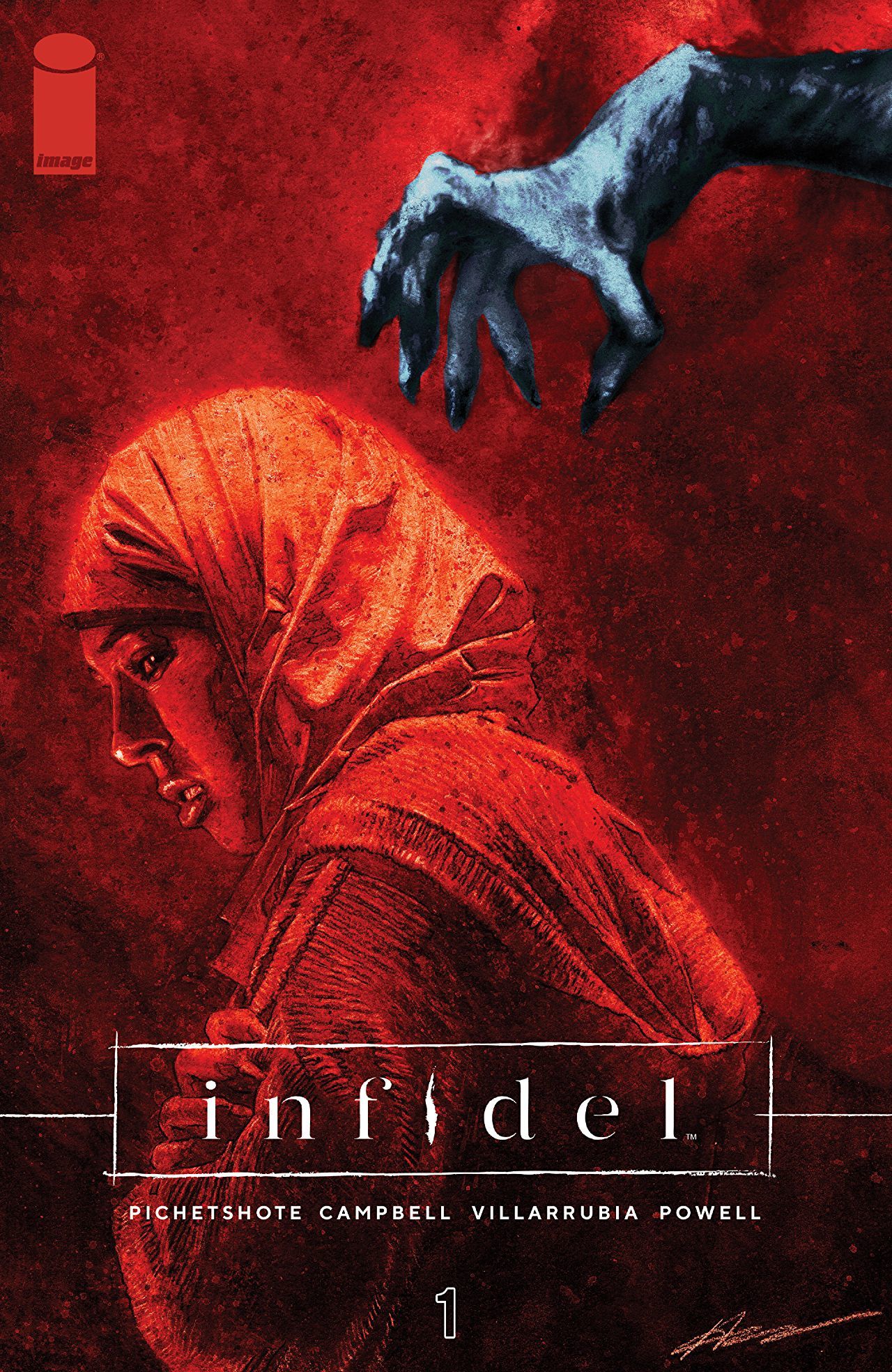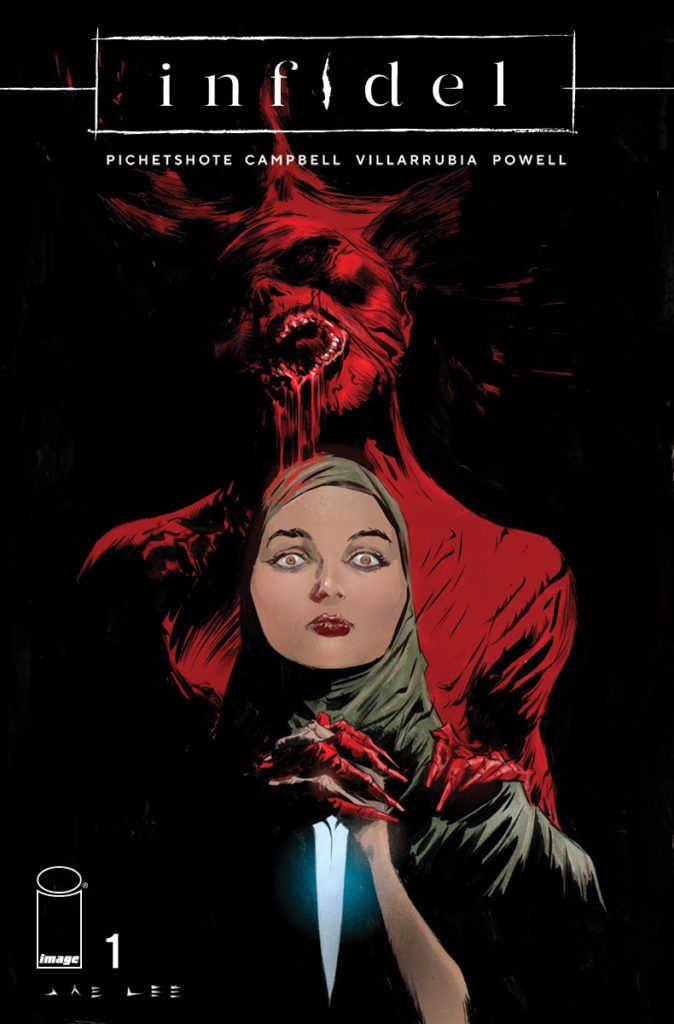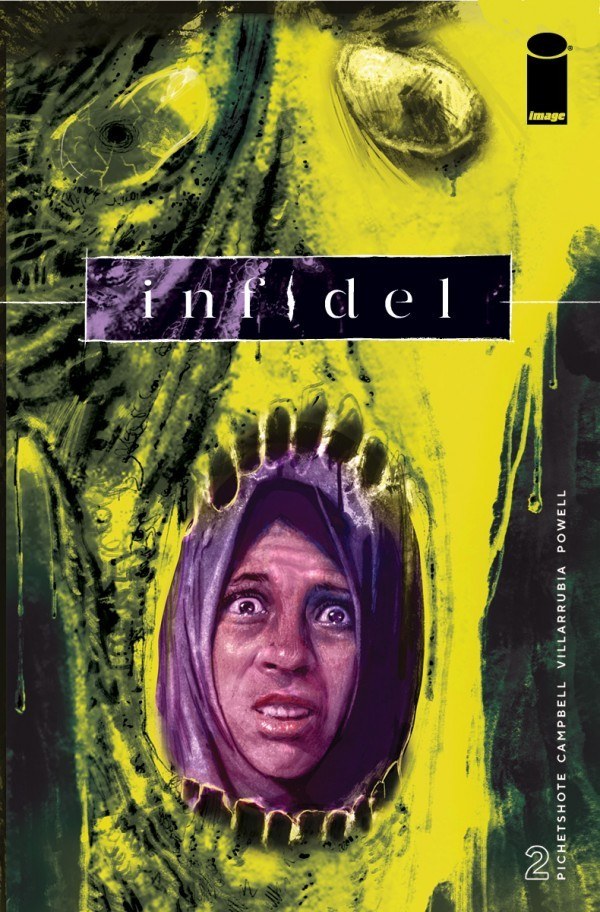The first weekend in March, Seattle, Washington welcomes one of the biggest comicbook conventions going: Emerald City Comic Con. It is a huge meeting of comic book artists, writers, and publishers from the smallest to the largest. This past weekend, Morgan had he opportunity to sit down with Pornsak Pichetshote, the writer of the upcoming limited series Infidel from Image. Pichetshote provided lots of informative insight into the process of developing Infidel. Writer Morgan Hampton met him in the lobby of the convention center where they hid in an empty shipping and receiving room in an otherwise crowded convention center. It was a typical interivew.
Morgan: For those who don’t know you, speak a bit about your background.
Pornsak: 12 years ago, I started off at DC as an editor for Vertigo. I was Karen Berger’s assistant. I rose through the ranks for the next seven years to become a full editor where I worked on books like Sweet Tooth, Unknown Soldier, Swamp Thing, Human Target and a bunch of other stuff. Around the seven-year mark, Geoff Johns made me an offer to move out to LA to be part of what was at the time the DC Media team. This was right when Smallville was ending and it was kinda like this blank slate of what DC Media was going to be. Working with Geoff, we started the TV division together and we got Arrow, The Flash, iZombie, Constantine and Gotham on the air. Then I kind of transitioned to oversee the TV department. I always have to laugh when I say the TV department because it was just me. My friends would be like, “He runs the TV department!” And I’d be like “Diiidd I run it??” I didn’t have a staff. But yeah, so it was me sort of overseeing all those shows, and I had no life and it was crazy. But I was, and Geoff knew this, but I was sort of itching to start a writing career. He was kind of like “Hey, you know, listen. I’m not looking to be an executive either, but my perspective is, this will give me a really great experience as I move on to the next thing and I think that could be the same thing for you.” What (eventually) happened was it got to the point where it was time for me to hire a staff because I didn’t want to do it all myself. Usually the point where I have to be a manager is the point where I’m like “Ahh maybe it’s time for me to look for something else.” I had written a script and my friends who were writers liked it. They sent it to their managers and agents and management got in contact with me. And so with all that stuff coming together it was a really good transition to leave DC but you know, comics is in my blood. It’s the girl that brought me to the dance. So I wanted to come back and write comics and so now, finally being able to make the time to do Infidel has been a nice, crazy ride.
M: Was Infidel something you had been working on for a while orrrrr?
P: Yeah! So I should start by saying that there are a lot of editors who write. If I look at the people who influence me, those like, ’80s Marvel guys, they all started off as editors and they became writers. But when I was an editor, because the generation before me was the Marvel bankrupt generation, you know all they’d do was give each other assignments. I had this stigma of, you know, editors should not write. Even now I go back and forth on it. I admire a lot of the editors who write, but I also kind of feel like if you’re a good editor there are five guys who can kill it if you give them a shot, you know? And if you put yourself as one of them, you’re taking a slot from somebody else so I felt very uncomfortable even thinking about writing comics while I was editing. But meanwhile I had this idea. At the time it was under Obama’s eight years where we were talking about this post-racial president and at the same time Islamophobia was just ramping up. So to me, it just seemed like there was this connecting line that we were not talking about. We weren’t having what we have now which is this national conversation about race. We were just like “Yep! We handled it! We elected a Black president. Let’s all pack up and go home!”
M: Which is similar to what’s going on with Black Panther right now. Some people are really like “Okay, racism’s over now”.
We both laugh uncontrollably.
Okay, it was just me.
P: But yeah. Part of that stemmed from wanting to connect the dots between Islamophobia and institutional racism down to the confusion surrounding race that we have right now. That’s kind of where the idea started. It had a bunch of different forms. Then when it finally came time to do my comic it was killing me that, that story was sitting in a drawer where every year headlines were coming out. It just felt like it was just more and more prominent to the point of — you know every year there would be a movie and Get Out was definitely one of them where I was like “Oh, shit, someone beat me to the punch”. It was gratifying to see, but also sad that we didn’t move past the conversation. If anything, it was just the nuances of the story was shifting to accommodate where we are in this particular moment in history when talking about race.
M: So speaking of Get Out, I read that you were hoping that the success of Get Out would make people more inclined to want to read Infidel.
P: Yeah, I hope so!
M: And I know a lot of Jordan Peele’s inspiration came from Obama’s eight years as well so it’s cool to see that little parallel between your works.
P: Yeah, yeah! I went through the exact same things that he talked about with, I don’t want to get into spoilers territory, but there are things that he’s talked about in shaping that story that was the exact same process I went through. When Jordan Peele was talking about Get Out, he felt that the country needed a wake-up call to have this conversation. Then he found that no, the country woke up but now the conversation needs to be about something else. And I went through the exact same sort of process with Infidel about what the story needed to be. On the one hand, you always want to be the first one out of the gate. You get bragging rights. But the great thing about having Get Out is that there is now a precedent of a horror movie talking about these issues. Before, I was kind of just like “yeahhhh, it’s kind of about race and it’s a horror movie” and people were just like “whhaaaaaaa?” And then with my story it’s a comic and nobody wants to think you’re doing anything too ambitious or anything like that. So post-Get Out, I like to think that there’s an audience that comes at this knowing that there’s a way we can tackle these themes in their complexity through the genre. I think before Get Out when I was talking about my book everyone was like “Wait, so it’s like Klan members who are ghosts orrrrrrrr?”, but yeah, that’s where I really feel grateful for—
Con Security: Oh, hi, could you please not sit up there. Thank you.
This really happened, y’all.
P: I’m always that guy hahaha.
M: Wheeeew, at least they didn’t kick us out.
M: So I know authorial intent is not what’s most important and instead it’s about reader interpretation. But as the writer, what is the thing you hope the audience understands the most?
P: You’re right. Reader interpretation is just something you can’t control so whenever I have these conversations I’m just like “This is what I hope happens”, but then people see other things.
M: Yeah, it’s interesting. People can pick up on things you didn’t even intentionally put there.
P: Exactly. But I do think one of the interesting things that we’re at in this particular moment is that there’s a national conversation on race that everyone wants to have but because a certain part of the country can suppress that for so long, we don’t nationally have the vocabulary to have that kind of conversation. As a result, when people talk about race, when people talk about gender, you see this little timer and everyone is like “Oh, man, when are they gonna say that thing that everyone’s gonna get upset about?” So for me, so much of what the conceit or the thinking that the book is steeped in is this idea that Islamophobia, racism, xenophobia are such undeniably unequivocally pernicious forces and yet at the same time there is so much confusion about the conversation of race. How do we have this conversation? Will any two people see it the same way if you put them in a room together? And if they don’t see it the same way, how do you talk about it? How do you take action about it? I don’t expect anyone to find solutions to those things in a five-issue horror book but one of the things I would hope is that it engages in that conversation in some way and uses some of that heightened genre to be a filter to sort of focus on these things. And with luck hopefully aspects of it we’re not talking about. But to me we’re at an interesting point right now where I think we need to talk about our confusion about race. Also, and this is where it’s really, really tricky: we have to have the conversation without conceding the fact that as a nation, we’re gonna screw up. What do we do after we screw up? Because right now there is a game of gotcha that’s happening and there’s this question of can you ever be redeemed, and as a result, it’s stopping people from talking now. How do you build empathy and how do you tell stories about empathy? One of the goals for Infidel is to do a book with a multiracial cast. Where I’m not ignoring how their religious faith affects their perspective, how their racial background affects their perspective. I’m only one fraction of that cast so talking to the people, having enough people inform me to try to have that conversation as much as I can, and I’m terrified about getting it wrong. Am I gonna misrepresent this thing, am I gonna send out the wrong message for that? But at the same time, I also feel like we need to have that conversation and have these stories sort of reflect that. We tried really, really hard not to misrepresent anyone or take shortcuts but if we do, how do we course correct from that, how do we make that part of the conversation as opposed to insulating the conversation from it so we can kind of all grow from there and that’s the thinking behind it.
M: So Infidel is gonna be a five-issue limited run. You mentioned that you wanted to get into more writing now, so do you have more on the horizon after Infidel? I’m sure you can’t disclose anything serious, but are you working on anything?
P: I have something I very much want to write and very much want to talk about but I can’t right now. But in terms of Infidel, we have talked about the idea of a prequel or a sequel. Infidel takes a lot of research to get right and it’s a lot of research that you can’t necessarily go to the bookstore for the answers, you have to talk to people and really listen so while we want to do prequels and sequels, a lot of it boils down to how much time it will take to do it where it does it justice. So, yeah I have another comic I very much want to do. I’m currently writing right now for the second season of Two-Sentence Horror Stories, a series on go90. Vera Miao is the showrunner. I’m one of the writers in Season 2. And Vera is such a kindred spirit. If I had known what Vera was doing, I would not have made Infidel because one of the things I wanted to do was genre horror stories where the people who don’t usually get a voice, people of color have their background influence the terms of the stories. I didn’t want to do The Walking Dead with all Asians. I wanted to have their backgrounds change the story in some way or affect the story in some way. And Vera has been doing that in Two-Sentence Horror Stories. The second season has some great stories in it.
M: Describe a little bit of the pitch process for Infidel.
P: So I brought the team together. When I was an editor over at Vertigo, whenever I got a book greenlit, I would call José Villarubia, who is the colorist and editor on Infidel and I’d be like “Okay José, I just got a book greenlit. Here are the artists I’m thinking of. This is what the book is. Who do you think the artist should be?” José, being a colorist knows a lot of artists, but he’s also just a student of comics art. He’s got a vast vocabulary, so when I had decided to do this book, he was the first call I made. And going back to comics made it so I got to talk to old friends again. José was the one that was like, “I’d like to edit this”, which is great because he’s such an icon in terms of coloring, and as an artist in his own right. And then he brought Aaron Campbell to the picture and because of the way this book came together, Image was the place that made the most sense. Like, I had an editor before I had an artist on this book, you know? That’s just a weird process of putting a book together, so Image was very much our first choice. That said, though, we had like a six month roll out strategy of like who would go and what kind of stuff, and what we did is we put together pitch packets. I think it was like sixteen pages which was a cover, an 8-page preview, a synopsis of the story, character sketches, and a copy of our pitch letter where we talked about the high concept and the potential audience and that sort of stuff. We sent it and as luck would have it, José was working with Jeff Lemire on what I think was Inferior Five, and he was talking about the book we were doing. Jeff, José and I all know each other from Sweet Tooth, and Jeff was so excited that I was writing and asked to see the pitch and he loved it, so he sent an email out to Eric Stephenson and he got back to us and from there we were off to the races. Since then, Image has been great to work with. I’m also really impressed how, I feel like it was last year, maybe February, when we got the approval, so the fact that I’m talking about it now? Like, I’m not used to comics moving that fast, so that’s also really cool and satisfying.
Infidel comes out March 14, 2018. For more details, here’s the official trailer from Image.
A haunted house story for the 21st century, Infidel follows an American Muslim woman and her multiracial neighbors who move into a building haunted by entities that feed off xenophobia. Bestselling editor Pornsak Pichetshote (Swamp Thing) makes his comics writing debut alongside artist extraordinaire Aaron Campbell (The Shadow), award-winning colorist and editor José Villarrubia (Promethea) and letterer/designer Jeff Powell (Scales & Scoundrels).
*Note: This interview has been lightly edited.
Are you following Black Nerd Problems on Twitter, Facebook, Instagram, Tumblr, YouTube or Google+?





Show Comments